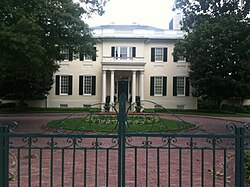Virginia Executive Mansion
|
Virginia Governor's Mansion
|
|

Virginia Executive Mansion on July 10, 2011
|
|
| Location | Capitol Square, Richmond, Virginia |
|---|---|
| Coordinates | 37°32′19″N 77°25′57″W / 37.53861°N 77.43250°WCoordinates: 37°32′19″N 77°25′57″W / 37.53861°N 77.43250°W |
| Built | 1811 |
| Architect | Parris, Alexander; Thompkins, Christopher |
| Architectural style | Federal |
| NRHP reference # | 69000360 |
| VLR # | 127-0057 |
| Significant dates | |
| Added to NRHP | June 4, 1969 |
| Designated NHL | June 7, 1988 |
| Designated VLR | November 5, 1968 |
The Virginia Governor's Mansion, better known as the Executive Mansion, is located in Richmond, Virginia, on Capitol Square and serves as the official residence of the Governor of the Commonwealth of Virginia. Designed by Alexander Parris, it is the oldest occupied governor's mansion in the United States. It has served as the home of Virginia governors and their families since 1813. This mansion is both a Virginia and a National Historic Landmark, and has had a number of successive renovations and expansions during the 20th century.
Adjacent and immediately north of Capitol Square is the Court End neighborhood, which houses the White House of the Confederacy. During the Civil War, Virginia's statehouse, also in Richmond, housed offices of the Confederacy. Tours of the mansion are offered several days a week.
When Richmond became the capital of Virginia during 1779, there was no residence for the governor, but Thomas Jefferson rented one. The state was so poor that it could not pay the rent in time and blamed Jefferson for the problem. The state finally paid its rent and built a residence for the governor on the site of the present building.
The law that provided for the construction of the current building was signed on February 13, 1811 by James Monroe, with the building being completed in 1813. He was succeeded by George William Smith. Smith, however, was not the first governor to live in the mansion because he lost his life in the Richmond Theatre fire while he was saving others on December 26, 1811. His successor, James Barbour, was the first governor to live in the mansion. The term "mansion" was not used in the law authorizing it to be built, but it has been used ever since.
...
Wikipedia


